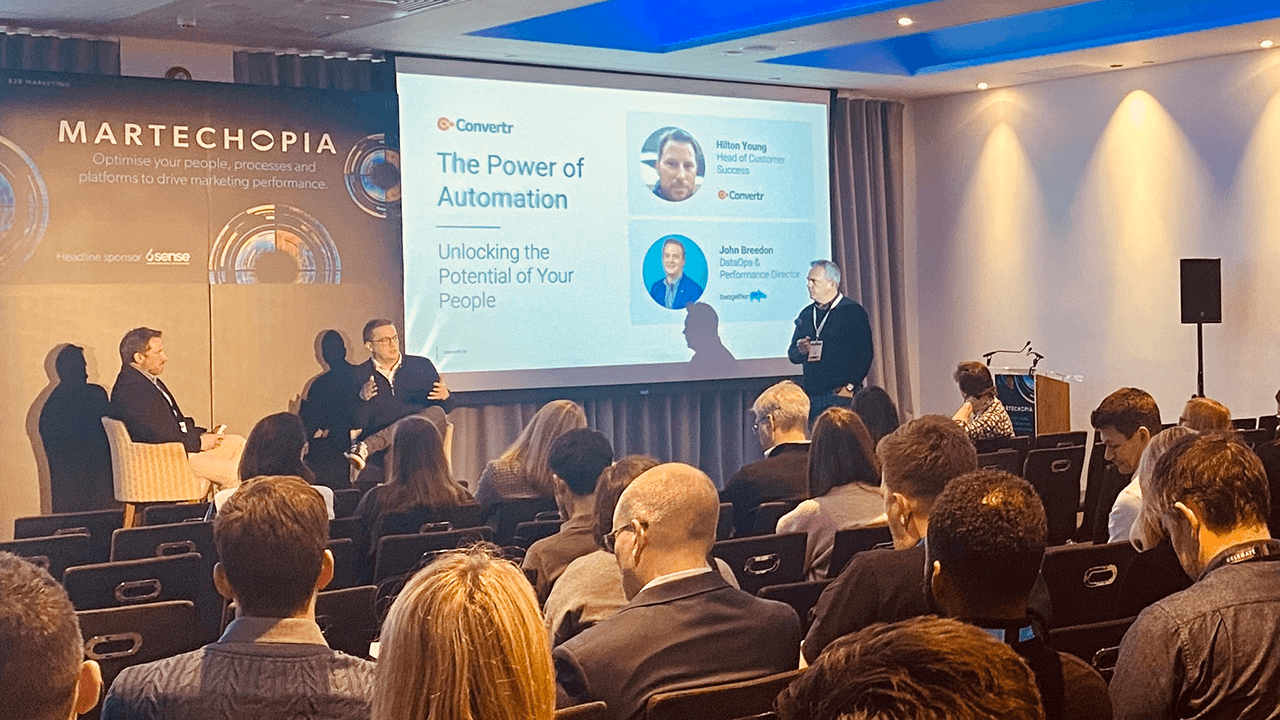Here at Convertr, we’re always looking to the future. Whether we’re anticipating new legislation, adding the features that our clients need most, or adapting our product to the shifting landscape of MarTech, we know the only way to improve is to keep looking forward.
Part of that vision for the future is bringing in the smartest, most capable leaders — leaders who can take a look at the big picture and bring their experience and intelligence to bear to make Convertr everything we know it can be.
With that, we’re happy to announce that Keith Wallington has joined Convertr’s leadership as our new Chairman. Keith has led strategy and execution in tech businesses since the 1990s, and we’re thrilled to add his skills to our team. We sat down with Keith to get his take on the industry and the future of Convertr.
What is your biggest achievement so far?
In business terms, I think the answer is a pretty obvious one: my time at Mimecast where I helped a business go from a small disruptive player to being one of the few dominant players in that space.
This meant crusading a cloud-based model which, back in 2008 when I joined the business, was anathema. People didn’t know what the cloud was and they weren’t about to be putting their data there.
So I think crusading cloud adoption and making Mimecast a great success must be my largest business achievements so far.
Since Mimecast, you’ve been more focused on chairman and investment opportunities. What do you look for in a company when you’re considering becoming a chairman?
To start, my process is not that dissimilar to what a venture capital fund would be looking at when assessing an investment — as of course, I invest in the businesses where I become a Chairman or a board member. So, like VC’s, I am looking at the “Idea, Team and Traction” elements: I’m looking for a great team with a remarkably large vision, a vision that could result in a big business that is the stand out winner in a big industry, and also good evidence that the team has been executing fairly successfully.
I have an additional criteria, “Fit”, and that is specifically the degree to which the team and I work well together. I can work with most people, but for me to really do what I need to do, I need to know I’m working with a team with whom I synchronize well and where there is a high likelihood that we will form a good team — particularly with the CEO, but also the exec team around that CEO. It’s really critical that I select businesses that are very open to someone running alongside them that isn’t in the business but could be very helpful in bringing ideas from the outside, that can help them see around some corners and avoid setbacks.
I will also look at the makeup of the Board. There are many ways of raising money from different great venture capital funds and private investors, and I want to make sure that the board is as good as it can possibly be — populated with strong, experienced contributors.
With so many exciting opportunities out there, what was it about Convertr that attracted you?
I know the pain. I have tried to deploy an appropriate marketing and sales tech stack in multiple businesses, including Mimecast, and I have been involved in trying to drag real-time useful data into that stack from third-party publishers and other sources of marketing data — and it’s a massive problem.
The Convertr solution is really elegant in its simplicity and usefulness, all the while offering very sophisticated functionality.
From a business and product strategy point of view, there is significant scope to expand — we have to be cautious about trying to expand the product set too soon, but I think we can play an even more important web glue role in the broader marketing landscape.
The second reason I am excited to be a part of Convertr is Emma and the team she has built: She has a very strong understanding of this market and the problems Convertr solves. Emma is also amazing at networking — she seems to know or have access to pretty much everybody in the industry. And Emma has done a great job of getting the business to where it is.
She’s very open to looking at how others have solved problems. She’s very open to getting support from a Chairman and the outside. I take my time when assessing investment and Chairman opportunities. During that process Emma and I met quite a few times, debating the industry’s challenges and how to solve them and it was clear to me she is a deep thinker with strong views on how to solve big problems. I like that a lot.
What excites you most about your position as Chairman of Convertr?
Some people might think this is a bit geeky, but Convertr is an extremely exciting solution because it addresses such a big pain point within such a big market. I love businesses that are delivering a relevant, unexpected, delightful solution that is hiding in plain sight. There’s something special about novel, unique services that elegantly fill an existing void — that solve a problem that so many people are experiencing. It’s good business to be solving a real problem with a great solution that makes people more productive in their roles.
What do you enjoy most about working the B2B SaaS space?
There is an elegance and a beauty to the SaaS business model. Again, this might sound bizarre, but business is one of my main interests and passions, and the SaaS business model — that annuity, rolling, subscription model — is a beautiful model. Not just because you have an annuity income, but because it’s an operating model that we can tweak and optimize so efficiently because it’s so measurable.
And, of course, it’s achieved a lot of benefit for industry because it makes it fundamentally more efficient and affordable for customers to buy services on a SaaS basis. It also means that they can make changes more easily — it’s not like the old days where you made a decision that needed to be the decision for ten years because you’re amortizing a massive upfront cost. SaaS has brought a lot of agility to any industry that’s adopting the approach.
My particular focus is on B2B, and within that, on services that are absolutely vital for mid-market and enterprise customers. I’m not really interested in businesses providing somewhat low-priority, nice-to-have stuff, I prefer to be solving real problems.
B2B SaaS services that fundamentally transform businesses really excite me. Bigger businesses have big problems that — if you can solve them by being a tightly integrated vital organ — means you are very likely to be renewed, very likely to be referenceable, and very likely to be able to grow with your customers and provide more services to them, i.e. cross-sell and expansion as they use more.
With small businesses, you inevitably see a lot more churning behavior, particularly in the MarTech industry. Marketing tech that isn’t solving a vital problem — a real, critical business problem — or providing services to smaller businesses inevitably has higher rates of churn and lower rates of renewal, and from a SaaS point of view, that “leaky bucket” is a disaster. People think SaaS is all about growth and they’re right, but it’s at least as important to focus on retention.
You’ve worked in the “Tech” industry for over 25 years. What’s the biggest change you’ve seen?
Adoption of cloud-based services is the big change, but I think there are a couple of effects that has had which are really interesting.
The first is the barrier to entry in terms of new startups has absolutely collapsed. All you need now is a warm room with internet access, electricity, and a good brain, and you can compete in many sectors that, up until ten years ago, you couldn’t. Cloud has proliferated a range of services that you can use to build your business. You can quickly sign up to services like Xero and AWS — and all the other pieces you need to build a business — for a very low starting cost.
You don’t need to think through anything except the core secret sauce that you deliver. Convertr doesn’t need to build its own accounting service, marketing tools, payroll, engineering tools, etc., because that’s all available now through the cloud.
That, in turn, has produced way more choice, which has forced a more rapid evolution towards really useful tools. We’re watching the laws of nature play out very rapidly now, very quickly forcing companies to constantly evolve their services, constantly be better, constantly be more focused on the customer and more effective at solving their customers’ problems.
Just like how technology providers have evolved through adopting cloud and SaaS services we’ve seen businesses that buy technology services transform themselves by buying services over the cloud. Their costs have massively reduced. They’re far more nimble and focused on their core area of expertise. Businesses no longer need to employ people to operate non-core functions (like managing email archives or manually moving marketing data, they access a SaaS service that solves that piece of the problem.
People talk about democratization, but it’s more like a liberation that’s going on, which is transforming the global economy. That great Andreessen Horowitz quote, “software is eating the world,” is so true, and it’s having good outcomes.
If you look back five or ten years, what developments have posed the most important challenges in the space?
With this explosion of competition, the labor market has lagged. It’s really difficult to recruit, attract, and retain really good people, because demand outstrips supply. That’s probably the big problem for the SaaS players operating in the space.
I think also, just as with any explosion of sudden activity, in nature or in business, there’s a lot of pain. There’s a lot of failure. And I think it’s been quite painful for Convertr’s “customer” — the CMO or the person in charge of demand generation — to try and figure out what to do with their marketing budget.
With such an evolution in marketing practices and proliferation in tools, it’s been very hard for marketers to figure out how to put their budget to work. In all this noise, and all this choice, what are the right technologies I should be working with? It makes it a lot harder for the buyer to sort the wheat from the chaff and really figure out who can actually solve the specific problem they have. But this explosion of marketing technologies has also allowed marketers to build a marketing tech stack unique to their requirement: that is very cool.
Tell me your thoughts on the future of MarTech and B2B SaaS
Five or six years ago, I was very animated about the importance of integration. I was talking about a shift away from lumbering, bloated platforms to highly focused point solutions, solutions that can now exist because the cloud enables them to pre-integrate with so many other pieces of the puzzle — hence my interest in companies like Convertr.
My great sense of urgency six years ago about being able to integrate with other SaaS services has really come to pass.
That’s a big factor, but what that means is that we are probably moving to a stage of the cycle where extremely deep point solutions are going to dominate in many instances. You won’t be buying solutions that provide a wide range of features, you’ll be buying point solutions that will pre-integrate with each other because you’ve got the likes of Convertr plugging it all together.
What does that mean for Convertr? It means that we could and should be the primary system of intelligence that is plugging that whole marketing landscape together. We could be the glue that allows the whole ecosystem to effectively, constantly and in real-time, share data. And that puts us in an extremely valuable position. That’s a vision that excites me massively.
An Eye To The Future
At Convertr, we know that the landscape of MarTech is constantly evolving and will continue to change faster and faster. From a product point of view, we’re well-equipped to handle the shifting sands of the MarTech world — our vision enables this world to evolve even faster and ensure its customers’ benefit.
We’ve been extremely proactive about compliance with data regulation from day one, and we’re dedicated to continued development in order to keep up with the new features our clients want.
The other half of the puzzle is ensuring that we have the right people — people who can see our vision, see the future of the industry, and forge a path forward that will keep us on the leading edge of our industry. In Keith Wallington, we’ve found an asset who can do exactly that.



